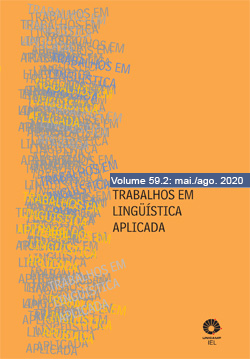Abstract
Brazil has the highest murder rate of transgender people in the world. The paper will focus on a debate of how audio description of some audiovisual products should be used to call the attention to the discrimination and violence suffered by homosexual couples. We have chosen a Brazilian music video called Flutua produced and performed by Johnny Hooker with special participation of the Brazilian singer Liniker, a black trans woman. The clip presents an outstanding visual narrative involving contemporary themes such as gays with disability, gender-fluid and homophobia. During the video a gay deaf couple spends a day having fun with friends in an urban scenario composed by known streets and places of Sao Paulo capital. At the end of the day a member of the group suffered a very violent attack. The audio description of the most relevant scenes, the identities and outfit of the singers, and their movements will be presented having in mind the music as protagonist of Flutua.References
BENECKE, B. (2004). Audio-description. In: Gambier, Y. (Ed.), Meta: journal de traducteurs. v. 49, n.1, pp. 78-80.
BRAUN, S. (2008). Audiodescription Research: State of the Art and Beyond. Translation Studies in the New Millennium, v. 6, pp.14–30.
BUTLER, J. (1997). Excitable Speech. A Politics of the Performative. New York: Routledge.
BUTLER, J. (2004). Undoing gender. New York, London: Routledge
BUTLER, J. (2007). El género en disputa. El feminismo y la subversión de la identidad. Barcelona: Paidós. Translation by Mª Antonia Muñoz.
CALDAS, C. H. S. (2013). Videoclipe 2.0: interatividade e regimes de interação na era digital. Dissertação de Mestrado em Comunicação Midiática. Universidade Estadual Paulista Júlio de Mesquita Filho, Unesp, Bauru.
CAMERON, D. (1995). Verbal Hygene. London/New York: Routledge.
CRONIN, M. (2009). Cultural Translation: An Introduction to the Problem, and Responses. Translation Studies, v. 9, pp. 216-219.
FRYER, L., ROMERO-FRESCO, P. (2014). Audiointroductions. In: Maszerowska, A., Matamala, A.; Orero, P. (Eds.). Audio description: New Perspectives Illustrated. Amsterdam/Philadelphia: John Benjamins Publishing Company.
HALL, S. (1996). Who Needs Identity? In Hall, S. Y du Gay, P. (eds.) Questions of Cultural Identity. London/Thousand Oaks/New Delhi: Sage Publications, pp. 1-17.
HOOKER, J. (2017). Flutua. [Video File]. (07m24s). Retrieved from <https://www.youtube.com/watch?v=mYQd7HsvVtI>
MARTEL, F. (2013) Global Gay. Paris: Flammarion
MARTÍN RUANO, M. R. (2018). Prólogo: Traducir(se) en la era de la post-identidad. In: Martínez Pleguezuelos, A. J. Traducción e identidad sexual. Granada: Comares.
MARTÍNEZ PLEGUEZUELOS, A. J. (2018) Traducción e identidad sexual. Reescrituras audiovisuales desde la Teoría Queer. Granada: Editorial Comares.
PRECIADO, P. B. (2005). Multitudes queer. Nota para una política de los ‘anormales’. Nombres. Revista de Filosofía, v.19, pp. 157-166.
ROMERO-FRESCO, P. (2013) Accessible filmmaking: Joining the dots between audiovisual translation, accessibility and filmmaking. The Journal of Specialised Translation, v.20, pp.201-223.
VILLELA, L. M. (2017). Audiodescrição sem pudores: acessibilidade aplicada a cenas eróticas e sensuais do filme Praia do Futuro. Trab. Ling. Aplic., v. 56, nº 2, pp. 347-357.
ZARDO, K.O. (2017). Produzir com qualidade: o papel do produtor em audiodescrição. In: Villela, L.M. (Org.). Acessibilidade audiovisual: produção inclusiva nos contextos acadêmicos, culturais e nas plataformas web. Bauru: Canal 6 Editora, p.13-28.
O periódico Trabalhos em Linguística Aplicada utiliza a licença do Creative Commons (CC), preservando assim, a integridade dos artigos em ambiente de acesso aberto, em que:
- A publicação se reserva o direito de efetuar, nos originais, alterações de ordem normativa, ortográfica e gramatical, com vistas a manter o padrão culto da língua, respeitando, porém, o estilo dos autores;
- Os originais não serão devolvidos aos autores;
- Os autores mantêm os direitos totais sobre seus trabalhos publicados na Trabalhos de Linguística Aplicada, ficando sua reimpressão total ou parcial, depósito ou republicação sujeita à indicação de primeira publicação na revista, por meio da licença CC-BY;
- Deve ser consignada a fonte de publicação original;
- As opiniões emitidas pelos autores dos artigos são de sua exclusiva responsabilidade.


